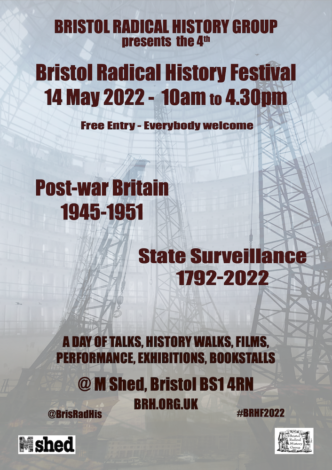Our panel of speakers will address the scandal of the Spycops, the hitherto secret operations of undercover cops spying inside labour and social movements since 1968. Since the scandal became public knowledge in late 2010 with the exposure of Mark Kennedy, activists have traced and identified numerous #spycops along with their true and false identities. They have exposed some of their law-breaking activities; internal cover-ups; and coercion of numerous innocent, mainly women activists, into […]
We are pleased to host this exhibition at the BRHFestival 2022 on 14th May at Mshed. You can view the exhibition from 10am to 4pm, at the Level 2 foyer, inside Mshed. Talk - 2pm at the Level 2 Foyer, Sue Tate, a trustee from the Feminist Archive South, will give a talk about the exhibition, and answer any questions. About the exhibition: Politics and Protest is a dynamic, colourful and inspiring exhibition of 70+ posters selected from Feminist Archive South's collection of over 1000. It was […]
Biographical documentary on Wally Hope of the tribe of Wallies who founded the Stonehenge Free Festivals in the 1970s. His is a tale of mystical visions, pharmaceutically induced nightmares, high court high jinx, pitch battles with the police and of possible conspiracy and intrigue. Narrated by Mark Savage and featuring Mark Stevenson, James Joel Dann, and Christopher Terry (62 mins). Followed by Q&A with Wally Dean. Watch the trailer below:
Black Power in Britain started in 1967, reached its apogee in 1971 and was in terminal decline by the mid-1970s. It was an expression of frustration, anger and – most importantly – resistance to the individual, institutional and state racism experienced by the postwar generation of black immigrants to Britain. The British state took the threat of Black Power very seriously, both at home and across the Commonwealth. When an international conference on Black Power took place in British […]
Individual Labour MPs such as Sidney Silverman were significant to campaigning for abolition of the death penalty in Britain and the Labour Party was more hospitable to the idea of abolition than the Conservatives. Nevertheless, despite passing the reformist Criminal Justice Act in 1948 the Labour Government was opposed to abolishing the death penalty, which did not happen in Britain until 1965. This talk will explore why the death penalty was not abolished in 1948. It will also examine how […]
Steve Hunt of Bristol Radical History Group will lead a stroll around some old haunts associated with Angela Carter and the 1960s and 1970s counterculture. Join Steve to reimagine the area around Hotwells and Clifton when it was a hotbed of what Angela Carter called "Provincial Bohemia." Angela Carter is widely appreciated as one of the most creative and engaging English writers of the late Twentieth Century, being author of such bestsellers as The Bloody Chamber, Nights at the Circus and […]
Blacklisted - the whole story (2016, 45minutes, Tom Wood/Reel News) This film is an account of the system of blacklisting operated by the UK construction industry. It includes interviews with blacklisted workers and members of the Blacklist Support Group, along with footage from protests & pickets, as the blacklisted workers fight for truth and justice. It describes how the industry operated a secret blacklist - via The Consulting Association - to prevent workers, who would make an issue of […]
The modern relationship between the British state and corporate surveillance dates back to a time of rapid industrial change between 1911 and 1921, when socialism and syndicalism formed a key part of public debate. To industrial workers these philosophies offered new ways of understanding industrial work, of organising protest, and of reorganising democracy. But to employers they threatened the smooth operation of industrial production and the free use of capital, while for the government they […]
Roger Ball will outline how during the Second World War the government introduced compulsory ID cards as part of their emergency measures. It was not until seven years after the War that ID cards were finally withdrawn. Clarence Willcock, a Liberal activist, was instrumental in this process; his refusal to show his ID card when stopped by the police in North London in 1950 raised questions about their use in peacetime Britain, led to a campaign and contributed to the withdrawal of the cards in […]
Catch Bristol's wonderful Red Notes Choir, who will support the Bristol Radical History Festival by performing at 12 noon. They'll be singing outside Mshed on the harbourside...unless it rains, when they'll be in the Ground Floor Foyer by the Mshed main entrance. The Red Notes Choir is a Bristol-based socialist choir. They have a repertoire of songs from around the world on historical, union, peace, green and human rights themes. "We use the streets of Bristol and further afield to spread our […]
